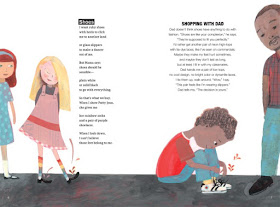Can I touch your hair? Poems of race, mistakes and friendship
We smile when we learn we both like books, but not sports.
We nod our heads over cool shoes and colorful laces.
Now we see each other as individuals ...
We share hurts like being left out at recess and getting into trouble with our parents. ...
We are so much more than black and white.
This is a complex book with so many layers that it risks being left unopened on the shelf if it is not shared with the child by an astute adult, either parent or teacher, who can begin and sensitively guide the conversations. The Bottom Shelf
The Bottom Shelf shared her review of this book and was immediately intrigued. I love the power of poetry, I love verse novels and this title sounded interesting. Very kindly The Bottom Shelf sent me her spare copy so now I can share my thoughts about this slim book of connected poems. (It's not quite a verse novel.)
Mrs Vandenberg sets a class project - pairs of students writing poems. Irene ends up with Charles. They are so different this pair of grade 5 kids but over the course of their writing their differences make way for understanding and friendship. Irene is white, Charles is African American. Irene is a shy girl who loves horses and reading. She longs to take part in playground games. Charles is clever and outspoken and he also loves reading. Charles wants to understand the adult world and the rules around race and fear.
The result is a set of alternating poems from each child. As a reader I imagined the conversations between Irene and Charles as they share their poems and experiences with one another. Church is different but in both places a white Jesus looks down on the congregation. A visit to the beach is torture for both of them even if the reasons are different. The fear of walking out after dark is the same for both sets of parents. "That's a rough neighborhood, especially in the evening." "Why Aunt Sarah doesn't go downtown after Dark - sky black, streets black, faces black, fear white."
This is an important book which should also generate conversations with children in Australia and it is a perfect book for teachers looking to explore perspective. It also shows the power of poetry as a way to express big emotions.
You can read more about the four people involved with creating this book at the Walker Books site.
Reviews:
School Library Journal
Kirkus star review
Horn Book Magazine
Jama's Alphabet Soup
You can see Charles Waters here (begin at 14.21 this is a long program so set aside some time) where he reads some of the poems and then answers questions. Here is a set of Teaching notes. Here is a ten minute interview at The Yarn with Travis Jonker.
Here is a poem by Irene which shows the power of this writing:
Apology
When Shona
presents
her family tree
to the class.
I see all
the top branches
are draped in chains.
Because my
ancestors
were slaves
she says.
I swallow
I want to say
I'm
sorry,
but those words
are so small
for something
so big.
Still I want to try.
So I write it
on a scrap of paper,
find her library book,
and tuck it inside.
Web sites for the collaborators who worked on this book of 33 poems - Irene Latham, Charles Waters, Sean Qualls (illustrator of Emmanuel's Dream), and Selina Alko.


No comments:
Post a Comment